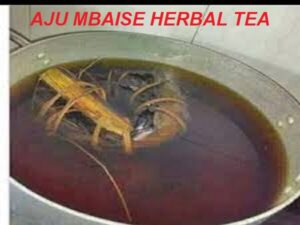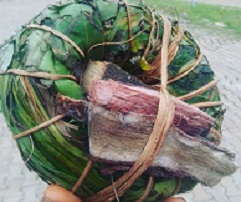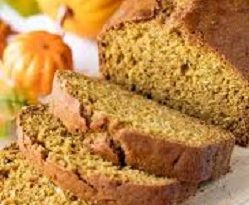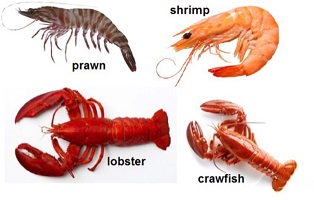Aju Mbaise Healing Soup for Nursing Mothers [Video]
Aju Mbaise Healing Soup for Nursing Mothers [Video]:
Aju Mbaise Healing Soup for nursing mothers in Nigeria, also known as Mmiri Ogwu, is a meal peculiar to the people of Imo State’s Mbaise zone. The name translates to “Mbaise wrap in English.” No Yoruba word yet
Table of Contents
Aju Mbaise Healing Soup Ingredients
The main ingredient is an herb created from a medicinal tree’s leaves and bark, which are put together in a bun.
Aju Mbaise tea is a drink that can also be used to make healing pepper soup. It has a harsh taste and a rich, fragrant perfume when cooked, and it turns light yellow.
About Aju Mbaise Healing Soup
Aju Mbaise Healing Soup is a pepper soup made with aromatic spices such as uda and vegetables such as oha, uturukpa, and uziza. Fresh fish, stockfish, smoked fish, catfish, and goat meat are all popular additions.
The Aju Mbaise healing soup is traditionally prescribed to nursing moms to help flush out post-pregnancy fat and toxins that stick to the stomach.
It improves women’s fertility by eliminating dead cells. Aids in ovulation regulation and detoxification for women who have had a miscarriage or abortion. It can also be used to treat early-stage fibroid and tumors.
Aju Mbaise Healing Soup Side Effect
However, the soup may be dangerous to pregnant women and their babies, and it can cause dizziness if consumed in excess.
In addition to ladies, men who want to lose weight can consume the soup.
It’s better to drink the Aju Mbaise Healing Soup while it’s still hot, as this boosts its effectiveness.
If you find this article educating, then am sure you will like my following write-ups on Aju Mbaise:
What are Aju Mbaise Traditional Medicine and its importance to women – folks?
Aju Mbaise Traditional Medicine is used mainly by singles, married, and nursing mothers to lose weight, reduce belly fat, increase fertility, prevent fibroids, blocked fallopian tubes, Aju mbaise, ovulation/the liver, etc.
The Aju mbaise is a fat-burning, mixture of 5 different leaves, bark, and roots of a medicinal tree enfolded together.
Aju Mbaise is a fat-burning slimming herb, a combination of 5 diverse leaves, roots, and bark of a medicinal tree wrapped together.

It’s an Orthodox method of trimming down and bouncing back post-pregnancy fat by the Mbaise women.
It is usually cooked with uda, uziza seeds, and ehuru ingredients.
Aju Mbaise is most notably good for women to take within 2 weeks after giving birth to flatten their Tummy and give them that figure 8 shape.
How to get a flat stomach, lose weight, and look good naturally can be achieved using Aju Mbaise flat tummy tea. Many Nigerians spent money and time to get the perfect body shape with no results.
What they did not realize is that Nigeria is a blessed country with a variety of natural herbs. These herbs are used in solving different difficult health-related issues.
One of the most powerful and effective herbs used is the amazing traditional wrap known as Aju Mbaise.
Aju Mbaise is a traditional method of trimming down fat, especially after giving birth.
The Aju Mbaise for fertility is a traditional medicine made of fresh herbs, fertility herbs, and fruits, blended to be taken within weeks for couples trying to conceive.
This fertility herb is also very good for women suffering from the hotness of the stomach as it calms the walls of the stomach down to enable healthy sperm to settle to form a baby.
Aju mbaise herbal tea, when consumed as slimming tea, is the best traditional herb for weight loss and a flat belly from Mother Nature. The origin of Nigerian food, Aju mbaise, is from a town called Mbaise in Imo State, Nigeria.
This fat-burning herb comprises uziza seeds, ginger roots, uda, the bark of medicinal trees and leaves, and uhiekirihio bound in a round shape. It is a golden yellow color after boiling, with a delicious aroma and a slightly bitter taste.
Aju mbaise herbal tea is good for women, especially nursing mothers. The herbal tea is generally active for weight loss, fertility, and correction of the irregular menstrual cycle. Men have also testified to its wonders.
Aju from Mbaise: Uses, Health Benefits and Side Effects
Health Benefits of Aju from Mbaise
Aju from Mbaise is an herbal blend consisting of the bark, leaves, and roots of five different plants, including ginger, uda (Negro pepper), and uziza.
Traditionally used in the preparation of pepper soup and various medicinal concoctions, it is sought after for its numerous health benefits.
The term “Aju from Mbaise” translates to “wrap from Mbaise,” referring to its origin in the village of Mbaise, Imo state. Despite its regional roots, the herb has gained popularity nationwide due to its acclaimed health properties.
Particularly favored by new mothers and those desiring weight loss, Aju from Mbaise is now commonly packaged as “slim tea” for convenient consumption.
Presented in wrapped leaves secured with small sticks, each component of Aju from Mbaise offers unique advantages.
Boiled without unwrapping, the herb-infused water is often enhanced with additional ingredients for taste.
While the brew carries a bitter-sharp flavor from its spices, its aroma is appealing. It can be enjoyed alone as a tea or used in cooking, though individuals seeking rapid results, such as those aiming to slim down, often prefer drinking the tea directly.
Health Benefits of Aju from Mbaise
Nutritional and Phytochemical Properties of Aju from Mbaise
In a 2019 study, researchers investigated the phytochemical composition of the ethanol extract of Aju from the Mbaise herbal mixture.
The findings revealed a significant presence of various phytochemicals in the herbal decoction.
The analysis identified alkaloids (8.69%), flavonoids (19.10%), glycosides (6.86%), hydrogen cyanide (0.92%), phenols (31.56%), saponins (0.83%), steroids (0.94%), tannins (16.80%), and terpenoids (14.31%).
In this article, we’ll explore some of the health benefits associated with Aju from Mbaise, shedding light on the advantages you can gain from incorporating this herb into your regimen.
Post-pregnancy Benefits
Due to its advantages for postpartum recovery, Aju from Mbaise is well-liked by new mothers. Primarily, it aids in replenishing essential nutrients depleted during pregnancy.
Additionally, it facilitates the reduction of postpartum abdominal bloating, restoring the stomach to its pre-pregnancy size.
Furthermore, Aju from Mbaise supports lactation by promoting breast milk production and assists in regulating the menstrual cycle post-delivery.
Moreover, a medical study conducted in 2016 revealed another potential health advantage of Aju from Mbaise.
The study findings indicated that the herbal decoction exhibited inhibitory effects on the proliferation of harmful bacteria in lactating mothers, further highlighting its therapeutic potential.
2. Weight Loss
Aju from Mbaise proves highly effective in aiding weight loss, particularly in reducing abdominal fat. Its mechanism involves breaking down fats into acids, facilitating their elimination from the body.
Additionally, it promotes metabolism, enabling the body to efficiently burn fat. These benefits extend to both women and men, making Aju from Mbaise a valuable asset in achieving healthy weight management goals.
3. Balance Menstrual Cycle
Women experiencing irregularities in their menstrual cycle often turn to Aju from Mbaise to restore balance and promote regularity, resulting in a more predictable and consistent menstrual flow.
Additionally, it alleviates menstrual discomfort, offering relief to those who suffer from menstrual pain.
4. Womb Flusher
Women utilize Aju from Mbaise to cleanse their wombs, expelling residual blood, fluids, and any other debris accumulated post-childbirth.
This practice not only diminishes the size of the womb but also aids in abdominal reduction.
Furthermore, women who have experienced miscarriages or abortions utilize Aju from Mbaise to purge their wombs, fostering uterine health and mitigating potential complications in future pregnancies.
5. Tackle Fibroid and Tumor
Women also consume Aju from Mbaise herb to address early-stage fibroids or tumors, aiming to reduce their size and alleviate the discomfort caused by their growth.
6. Fertility Potion
Aju from Mbaise also enhances fertility in women by promoting uterine dilation and purification, rendering it conducive and prepared for pregnancy.
Side Effects of Aju from Mbaise
The risks associated with consuming Aju from Mbaise are generally minimal, but caution is advised.
Pregnant women are advised to avoid the herb due to its potential to increase the risk of miscarriage and birth defects in babies.
Nursing mothers should also moderate their intake as it may impact the baby’s weight.
Common side effects include light-headedness or dizziness when consumed excessively, as well as increased hunger.
Overall, it’s important to consume the herb in moderation to mitigate any potential adverse effects.
What is the composition of Aju from Mbaise?
Aju from Mbaise is a blend comprising ginger roots, traditional leaves, uziza seeds, uda, and the bark of a specific medicinal tree indigenous to Mbaise.
Uhiokirihio, or whole spice, is incorporated with the Aju from Mbaise leaves. This combination not only enhances the flavor but also acts as a fat-burning spice, targeting the reduction of starch in cooked meals.
How do you use dried aju from Mbaise?
Make sure to obtain the dried ingredients and blend them at the market.
Take one aju from Mbaise, wash it thoroughly without untying it, and place it in a pot along with the attached sticks.
Add one full spoon of the blended spices to the pot, then pour in enough water to cover the aju. Cook for approximately 30 minutes, then remove from heat.
What do dehydrating herbs do?
The cell walls bring out the flavor. Dried herbs can be stored successfully for up to one year in a cool, dry, dark place.
Drying herbs at too high a temperature can result in flavor loss. The best time to harvest herbs for drying is before the flowers first open (the bursting bud stage).
What are the benefits of spice-infused water?
Here are a few of the benefits of spices when consumed in the morning, shared by Sharanya:
- Drinking spices soaked in water can prevent the onset of inflammation in the body.
- They have anti-inflammatory properties and are antioxidants for the body.
- They help boost metabolism.
- Improve digestion.



